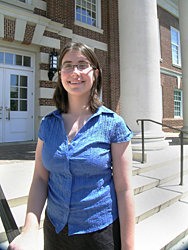
According to NSF, the fellowships, which pay a stipend of $30,000 a year in addition to tuition and fees, are “one means of assuring the continued growth and progress of science, mathematics and engineering in the U.S.” In a typical year, close to 9,000 applications are received for about 1,000 fellowships. Applicants are judged on intellectual merit and broader impacts by a panel of experts selected by NSF.
Ackerman will use the money to study environmental engineering at the University of California at Berkeley. She said she also considered Yale University but ultimately chose UC Berkeley for the quality of its program and the breadth of its course offerings. The school's environmental engineering graduate program was ranked second in the nation by U.S. News & World Report in 2007, and the wide range of courses offered will enable Ackerman to take classes outside her chosen discipline.
Because the fellowships provide students with funding that is not tied to their faculty advisers' research grants, awardees have more leeway in choosing their dissertation topics. Although she is unsure of the exact focus of her doctoral research, Ackerman said she is considering a couple of possibilities. She is interested in the area of environmental chemistry and may study under Prof. David Sedlak, whose work addresses the behavior of chemical contaminants such as hormones in wastewater. At the same time, she continues to have an interest in the work she did at Delaware, which focused on the effects of soil properties on dissolved organic matter. While she said she really enjoyed her work on soils, she admits that she should “branch out.”
Ackerman credits Allen, who is director of UD's Center for the Study of Metals in the Environment, with her decision to go to grad school. Allen, in turn, refers to Ackerman as the top undergraduate student he has encountered in more than 30 years of teaching.
“She impressed me on the first day of class in my Introduction to Environmental Engineering course,” he said. “She was articulate and informed. Later, she demonstrated that she understood all aspects of the course material. During the semester, I invited her to do laboratory research with me, and she made important contributions to the design and execution of the research.”
Ackerman said she found the research process to be extremely rewarding. “I was treated with respect as a contributor to the research, and I loved the experience of learning through seeing, touching and feeling,” she said. “Dr. Allen gave me the opportunity to gain experience and publish my work. I wouldn't be where I am without him.” Ackerman also benefited from the mentoring of two other outstanding faculty members: Dominic Di Toro, Edward C. Davis Professor in Civil and Environmental Engineering, and Donald Sparks, S. Hallock duPont Professor and chairperson of the Department of Plant and Soil Sciences.
The six papers on which Ackerman is a co-author certainly played a role in her winning the NSF fellowship. But the reviewers of her application also gave her high marks for her technical understanding, leadership qualities and participation in outreach activities. One wrote, “This candidate has much to offer the profession.”
Allen agrees. “I hope she'll become a university professor,” he said. “But regardless of her ultimate career path, she'll make major contributions to the environmental engineering field.”
NSF accords honorable mention to applicants who merit graduate research fellowships but to whom awards cannot be made because funds are not available. Three current or former UD students received an honorable mention, which is considered a significant academic achievement nationwide. The students included Andrew Seagraves, a senior in mechanical engineering; Eric Pridgen, who graduated from UD in 2003 with a degree in chemical engineering and is now a graduate student at the Massachusetts Institute of Technology; and Daniel Roche, who graduated in 2006 with dual degrees in applied music and computer and information sciences and is now a graduate student at the University of Waterloo in Ontario, Canada.
Article by Diane S. Kukich
Photo by Doug Baker


